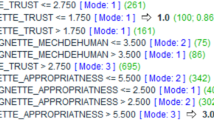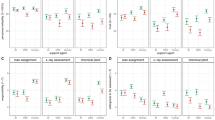Abstract
The integration of artificially intelligent decision support system agents as part of the external resourcing function of human resources management raises the issue of the effectiveness of the collaborative process between these agents and human resources managers and the cognitive and perceptual factors underlying the willingness to delegate such decisions. However, little is known about the neuropsychophysiological factors leading to the willingness to delegate decision-making to artificially intelligent decision support system agents in collaborative decision-making within human resources management. This research proposal explores how the perception of agency and trust affects the willingness to delegate personnel selection decisions to such agents. A single-factor within-subject design will be developed, where information provisioning as a proxy for situation awareness will be manipulated. Neuropsychophysiological and perceptual data will be collected to identify the neuropsychophysiological correlates of the perceptions of agency and trust and determine how they affect this delegation process.
Access this chapter
Tax calculation will be finalised at checkout
Purchases are for personal use only
Similar content being viewed by others
References
Oehlhorn, C. E., Maier, C., Laumer, S., & Weitzel, T. (2020). Human resource management and its impact on strategic business-IT alignment: A literature review and avenues for future research. The Journal of Strategic Information Systems, 29, 101641. https://doi.org/10.1016/j.jsis.2020.101641
Schneider, S., & Leyer, M. (2019). Me or information technology? Adoption of artificial intelligence in the delegation of personal strategic decisions. Managerial and Decision Economics, 40, 223–231.
Keding, C. (2021). Understanding the interplay of artificial intelligence and strategic management: four decades of research in review. Springer International Publishing.
Endsley, M. R. (1995). Toward a theory of situation awareness in dynamic systems. Human Factors, 37, 32–64.
vom Brocke, J., Hevner, A., Léger, P. M., et al. (2020). Advancing a NeuroIS research agenda with four areas of societal contributions. European Journal of Information Systems, 29, 9–24. https://doi.org/10.1080/0960085X.2019.1708218
Demir, M., McNeese, N. J., & Cooke, N. J. (2017). Team situation awareness within the context of human-autonomy teaming. Cognitive Systems Research, 46, 3–12. https://doi.org/10.1016/j.cogsys.2016.11.003
Riek, L. (2012). Wizard of Oz studies in HRI: A systematic review and new reporting guidelines. J Human-Robot Interact, 1, 119–136. https://doi.org/10.5898/jhri.1.1.riek
Hinds, P. J., Roberts, T. L., & Jones, H. (2004). Whose job is it anyway? A study of human-robot interaction in a collaborative task. Human-Computer Interact, 19, 151–181. https://doi.org/10.1207/s15327051hci1901&2_7
Jeunet, C., Albert, L., Argelaguet, F., & Lécuyer, A. (2018). Do you feel in control?: Towards novel approaches to characterise, manipulate and measure the sense of agency in virtual environments. IEEE Transactions on Visualization and Computer Graphics, 24, 1486–1495. https://doi.org/10.1109/TVCG.2018.2794598
Farrer, C., & Frith, C. D. (2002). Experiencing oneself vs another person as being the cause of an action: The neural correlates of the experience of agency. NeuroImage, 15, 596–603. https://doi.org/10.1006/nimg.2001.1009
Dewey, J. A., Knoblich, G. (2014) Do implicit and explicit measures of the sense of agency measure the same thing? PLoS One, 9
Riedl, R., & Javor, A. (2012). The biology of trust: Integrating evidence from genetics, endocrinology, and functional brain imaging. Journal of Neuroscience, Psychology, and Economics, 5, 63–91. https://doi.org/10.1037/a0026318
Garau, M., Slater, M., Pertaub, D. P., & Razzaque, S. (2005). The responses of people to virtual humans in an immersive virtual environment. Presence Teleoperators Virtual Environ, 14, 104–116. https://doi.org/10.1162/1054746053890242
Courtemanche, F., Léger, P.-M., Fredette, M., Sénécal, S. (2022). COBALT—Photobooth: Integrated UX Data System
Courtemanche, F., Labonté-LeMoyne, E., Léger, P. M., et al. (2019). Texting while walking: An expensive switch cost. Accident Analysis and Prevention, 127, 1–8. https://doi.org/10.1016/j.aap.2019.02.022
Courtemanche, F., Léger, P. M., Dufresne, A., et al. (2018). Physiological heatmaps: A tool for visualizing users’ emotional reactions. Multimed Tools Appl, 77, 11547–11574. https://doi.org/10.1007/s11042-017-5091-1
Yang, X. J., Unhelkar, V. V., Li, K., & Shah, J. A. (2017). Evaluating effects of user experience and system transparency on trust in automation. ACM/IEEE Int. Conf. Human-Robot Interact. Part, F1271, 408–416.
Author information
Authors and Affiliations
Corresponding author
Editor information
Editors and Affiliations
Rights and permissions
Copyright information
© 2022 The Author(s), under exclusive license to Springer Nature Switzerland AG
About this paper
Cite this paper
Korosec-Serfaty, M., Sénécal, S., Léger, PM. (2022). Decision Delegation and Intelligent Agents in the Context of Human Resources Management: The Influence of Agency and Trust. A Research Proposal. In: Davis, F.D., Riedl, R., vom Brocke, J., Léger, PM., Randolph, A.B., Müller-Putz, G.R. (eds) Information Systems and Neuroscience. NeuroIS 2022. Lecture Notes in Information Systems and Organisation, vol 58. Springer, Cham. https://doi.org/10.1007/978-3-031-13064-9_17
Download citation
DOI: https://doi.org/10.1007/978-3-031-13064-9_17
Published:
Publisher Name: Springer, Cham
Print ISBN: 978-3-031-13063-2
Online ISBN: 978-3-031-13064-9
eBook Packages: Behavioral Science and PsychologyBehavioral Science and Psychology (R0)




